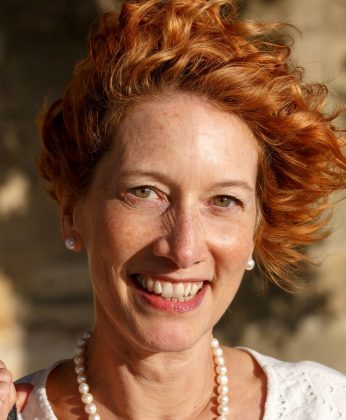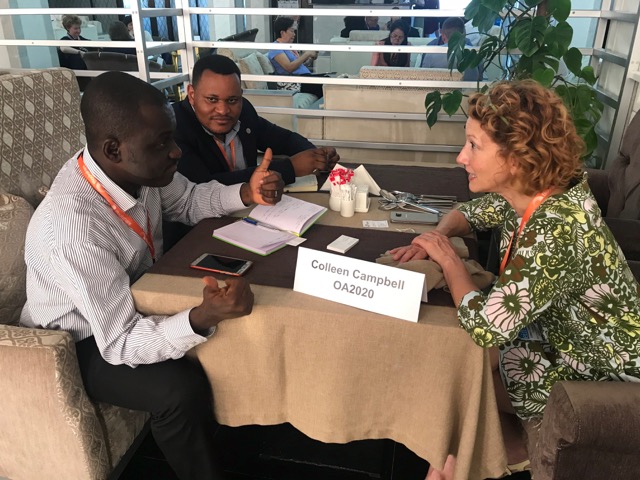Colleen Campbell: profile of a global Open Access champion

Colleen Campbell says it’s difficult to describe her job. On behalf of the Max Planck Digital Library (MPDL), she leads external engagement in the Open Access transition. In practice, this means coordinating the OA2020 and ESAC Initiatives.
Her work also involves external engagement within the context of Germany’s nationwide DEAL agreements whose implementation is operated through MPDL Services GmbH, associated with the Max Planck Digital Library.
All these undertakings aim to facilitate the transition of today’s scholarly journals to Open Access publication models. Neither ESAC nor OA2020 has a formal governance or structure; rather they are community initiatives. The Open Access 2020 Initiative is the international effort that aims to transition today’s scholarly journals to open access publishing models, while the ESAC Initiative is a global community of practice of libraries and consortia promoting efficiencies and standards around the negotiation and implementation of transformative and open access publishing agreements.
The participants are mainly representatives from academic institutions who understand the value of open scholarly publishing and who wish to change the business model underling scholarly journal publishing. Joining is a way of signalling interest, of saying to publishers, “We want to work with you to enable your journals to become OA”. Colleen says she is keen to help with any ideas that enable money currently committed to journals subscriptions to be repurposed to support the dissemination of content free at the point of use, as opposed to its being posted behind paywalls.
Asked why the Max Planck Society is the self-appointed champion of these global initiatives, Colleen explains that it is one of the world’s top ten research organisations, publishing between fourteen and fifteen thousand journal articles each year. Right from the start, it was clear that the whole Open Access movement – which really started with the Berlin Declaration in 2003 is good for science, because sharing the results of scientific research enables science to progress further and faster and reach its true potential. At Max Planck it was recognised early that this required a leadership role. Consequently it invested in initiatives to bring scientific publishing to the world by challenging processes that were (and are) still deeply rooted in print.
Colleen adds that it was frustrating to know that the technology was already available for sharing the whole corpus of scientific knowledge and “building that enormous data set”, but its deployment was impeded by adherence to outdated customs and business models. Ironically, the onset of the Covid pandemic speeded up the sharing of research, as publishers realised the need to open up content.
The Open Access movement does not denigrate the role of publishers: the publisher still fulfils the vital function of supplying scholarly publishing with all the services it needs. “As long as scholars feel those services are of value, publishers will continue to exist.” The question individual publishers most need to ask themselves is “What is our value proposition?”. The subscription model was based on access. In a digital society, it is not good business practice to charge for access for many reasons, including some pragmatic ones – for example, if academics can’t get the information they need from bona fide publishers to support their research, they will go to pirate sites instead, because they must have the content. The real publisher value proposition lies in providing scholarly communications services to authors – setting up robust peer review facilities, strong and authoritative editorial boards, etc.
From the library perspective, the subscription system presents increasingly insurmountable challenges. For example, subscribing to a “Big Deal” means that library expenditure on the same product increases year-on-year as prices rise, meaning that more and more budget is gobbled up and even exceeded. As most budget is committed to scientific journals, this puts AHSS authors at a disadvantage. If expenditure is shifted to investment in OA, a big lump sum is then disaggregated and freed up for all researchers, wherever they choose to publish. The article becomes the transactional unit, rather than the journal or a compendium of journals. This raises another issue: maybe, going forward, the journal no longer offers the ‘wrapper’ that researchers need, but it will ultimately be the researcher communities themselves who determine the formats that are most useful to them.

Colleen’s job is to carry these messages around the world to help institutions, consortia and other organisations to understand the logic behind Open Access and help them build the capacities for such a transition. There is no formal obligation placed upon participants in OA2020; rather, OA2020 constitutes a global network of institutions who hold the same objectives and who share strategic and operational insights and good practice as they put their best efforts to repurposing collections funds. Essentially, she is about motivation, inspiration, and capacity building spurred by the underlying principle that money currently invested globally in the subscription system is enough to sustain the transition to OA.
Undoubtedly, this is complicated. Publishers must rethink not only their value propositions, but also their revenue streams. Who is sustaining scholarly journals and in what proportions? What is the make-up of the journals themselves: who contributes to them? Librarians, at both the institutional and national levels, must carry out analysis that helps them understand not only the needs of researchers as readers but researchers as authors, and . The two, currently distinct, funding streams of subscriptions and article processing fees must also be rethought and, in some cases funding distribution needs to be changed radically.
And the message about the open access transition currently underway in scholarly publishing must progress beyond libraries. Colleen’s task is to bring together multiple stakeholders: “My efforts include working with funders, Coalition S, consortia, government ministries—all of those stakeholders who in one way or another contribute to the financial streams of scholarly publishing. Recognizing that authors value scholarly journals, we also partner with the publishing community to explore ways to transition journals in a way that is sustainable. We want to preserve the services our authors want. We understand, for example, that there is no one-size-fits-all in terms of open access business model. Some small scholarly societies, for example, may not yet have the capabilities to implement publish and read models, in which an institution pays for open access publishing of their own authors’ articles, but may pilot other kinds of models, such as tiered pricing or ‘subscribe to open’ in which the fees are paid to enable and open access ‘flip’ of the entire journal.”
Colleen spent her first two years in post travelling the world and conducting workshops to explain the concepts she has outlined above. Now her work focuses on the more practical and operational aspects of transitional or ‘transformative’ agreements. How do they work? What kinds of analysis need to be done? “It is extremely rewarding to see the action that is being taken. That’s what we want: action. Cambridge University Press understood the landscape, made a strategic decision to embrace it and stuck to it. It’s been brilliant to see Cambridge’s active pursuit of transformative agreements around the world.”
Colleen says she has had “an amazing career, with a trajectory based on serendipitous moments”. Born in Indiana, she acted professionally and considered becoming an actress, but always loved books and libraries and worked in a library as a student. This gave her the opportunity to meet an Italian library supplier. Her studies then focused on Italian, so she travelled to Italy and found work with the same supplier, Casalini Libri, working for it for twenty years, during which time she travelled North America, Asia and Australia as a salesperson. When her children were old enough, she wanted to move on to working from a different perspective and by chance, at the Fiesole Retreat, was introduced to a senior representative from JSTOR who was looking to recruit a partnerships manager in Europe. This enabled her to get to know the leaders of the library consortia in Europe. Looking for yet greater involvement in the library domain, she met Ralf Schimmer, of the Max Planck Institute, who appointed her to the post described in this article.
When not working, Colleen is a keen tap dancer. She also sings in a garage band and likes running and hiking.






